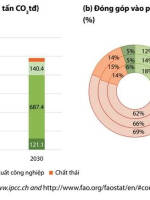
Since the beginning of 2024, producers and importers have to recycle rubber tyres inner tubes, batteries, lubricant oils, and cartons according to the mandatory recycling rate and specifications. This is part of Vietnam’s effort to implement the extended producer responsibility (EPR) as institutionalised in the Law on Environmental Protection (LEP) adopted in 2020.
To implement EPR smoothly, we have also been completing guiding documents, and simultaneously making technical adjustments. For example, we built a draft decree amending and supplementing many articles of Decree No.08/2022/ND-CP in 2022, detailing several articles of the LEP which includes amendments to EPR. The technical amendments help to facilitate the organisation of the statement authorities and implementation of the business community.
In addition, the new decree will more clearly identify the target audience and packaging items belonging to EPR, and make recycling more simple. The new policy will identify the list of producers and recycling businesses and clarify their functions.
In addition, the amendment to Decree 08 also includes content clarifying the authority of Vietnam’s EPR Office, which is a unit of the National EPR Council. If this office does not have sufficient authority, the system cannot operate smoothly. Businesses should also understand that to implement EPR smoothly, it is necessary to have an operating organisation that does not use the state budget.
In general, the legal document framework regulating the responsibilities of producers and importers is complete. We have also developed guiding documents and submitted them to competent authorities for approval. However, EPR and the “Fs” formula are new issues and concepts in Vietnam; thus there are many different opinions on these issues, so guiding documents have yet to be approved.
Documents on Fs, which is the norm of product and package recycling costs, were submitted to the government in November. Currently, the government office is still in the process of verifying and getting opinions from units. We expect the policy will be approved imminently.
Currently, the regulations on EPR have not clarified the issue of collection, so shortly, we will still adjust the regulations on EPR to make the collection more effective.
Producers and importers are ready
The amount of packaging and products of businesses applying EPR liability accounts for about 70-80 per cent of the market share. Many producers and importers have specific actions to carry out their responsibilities.
Some businesses prefer to contribute money into the Vietnam Environmental Protection Fund. Some large businesses combine the plans to hire recycling facilities and authorise intermediate organisations to support recycling efforts.
A few years ago, leading foreign and Vietnamese companies established the Packaging Recycling Organization Vietnam (PRO Vietnam) which is authorised to support them in carrying out this responsibility. The coalition currently has 22 members.
In addition, producers have also changed package designs, switching to packaging that is easier to collect and recycle, for example aluminium, or they have reduced packaging materials to reduce liability.
Regarding businesses in electricity, electronics, and batteries, they have also made clear moves to limit their EPR liability. Enterprises, such as HP, LG, Samsung, Panasonic, and Canon have also researched prudently so they are ready to implement.
In addition, car and motorbike manufacturers will not have to carry out EPR responsibilities until 2027, but they are already very responsible. For example, the Vietnam Automobile Manufacturers’ Association registered to become an authorised unit to implement EPR for car producer and importer, and has also begun researching solutions to collect end of life vehicles to present to the competent authorities.

Clearing up issues related to recycling costs
While waiting for the policies relating to EPR and Fs to be approved, it is necessary to increase promotion so that businesses have a deeper understanding of the nature of Fs.
To date, many producers, importers, and associations still express their concern that the offered Fs is high. One of the reasons is they still do not properly understand the nature of recycling cost norms.
The current Fs is the result calculated after a survey and consultation process at businesses and recycling facilities in both the south and north. The Fs is based on treatment technology, and treatment results are also consistent with the appropriate mandatory recycling specifications in Appendix 202 of Decree 08. When we determine the universal price of Fs, we also apply an adjustment coefficient (which is lower than 1). The addition of the adjustment coefficient made the actual recycling cost norm lower than the number that we calculated after doing the survey.
Moreover, Fs’s role is to help the state determine the amount of money that producers must pay to carry out their EPR responsibilities if they do not organise recycling themselves. In reality, recycling costs are negotiated and decided by producers, importers, and recycling units.
Businesses can thoroughly organise their recycling, hire a recycling unit or authorise another unit to recycle. If they see that the Fs is high, they can consider selecting the suitable options. The law allows producers to either recycle themselves or hire recycling facilities, or authorise intermediate organisations to support recycling efforts.
Therefore, the complaints of producers and importers about high Fs levels are unreasonable. The state must always set a certain norm as a basis for determining recycling costs, which is the role of Fs.
The question now is how to balance Fs because if it level is too low, it cannot attract recycling businesses because it affects the actual recycling cost. In addition, if the price is low but the recycling price is high, the producers and importers will question, as a result, recyclers have to adjust the recycling fee to lower costs, thereby affecting the efficiency of recycling and the production of products from recycled materials.
In other words, it will be a race to the bottom effect of recycling quality cause wasting resources – this is dangerous for the young recycling economy in Vietnam. Therefore, we need to balance the benefits of both recyclers and producers. The important issue now is to disseminate information to businesses so that they understand the nature of Fs.
In addition, to encourage recycling companies, we built a circular promulgating the regulation on management and use of producers and importers’ financial contributions to support recycling and waste treatment. We have now submitted it for approval.
The circular will contribute to ensuring transparency, and ensuring that money is used for the right purpose according to the law because this amount will be audited annually. It also clearly stipulates that the purpose of using this money is to support recyclers in collecting and recycling products in the EPR list.
The highest support level is equal to Fs. In addition, the contributions will be used to support localities in managing household solid waste and collecting and processing pesticides packaging.
During the process of finalising the policy, we absorb all comments from businesses and associations. We have carefully studied all opinions of relevant units in the spirit of inquiry, listening to the views of all parties, including any disagreements. If these opinions are correct, we will accept them; if they are not correct, we will explain.
However, these opinions do not govern the content of the policy because we have principles for receiving and explaining opinions. If the development of legal policies is influenced and regulated by factors outside the principles of state management, it is incorrect and unacceptable. State-owned enterprises should also understand that they cannot interfere too deeply with state management principles: they can contribute ideas but cannot interfere and cannot act for them.
Nguyen Thi




